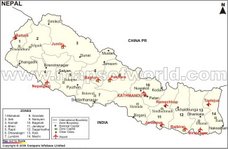China has a strong plan to construct a road up to the base camp of Mt.Everest. This has been a cause for anxiety for the entire countries of this region. The anxiety of twofold --- environment and ecological disaster and its impact on the region and the adverse effect of such a venture on the tourism sector. Have the environmentalists, whether under the name of Greens, Friends of the Earth or others, shown their extremely serious concern on the project's adverse effect upon the overall environmental and ecology?
The road to Mt. Everest is symbolic of the present government's soaring ambition and China will stop at nothing to prove a point to the watching world as a run- up to the Beijing Olympics in 2008.The track of that road, in fact, was constructed a couple of years earlier and it is understood that considering the Olympic Games to be held in China in 2008, the road is to be black potted so as to be transported up to the base of Mt. Everest.
China, once having declared its plan and program, is reputed to complete such projects in less than the prescribed time. This has been demonstrated even in the case of a mammoth project like the three Gorges project or the Lhasa Railway. Each of them was completed earlier than the planned time. Mandip Singh Soni from India has visited and seen the project. Accordingly, he has clearly noticed a road going up to the base camp. It was not yet metalled but was good enough for mini-buses, cars and horses carts to ply on.
In fact, four kilometers short of the base camp is a house cart stand. A road up to the base camp of Everest would mean to flux of tourists commercial activities, thereby passing a threat to the environment.
Himalayas' geology and ecology is vulnerable and also very young. This means that constructions works, use of road materials, drilling, digging, explosion etc will seriously damage the environment and undermine the sanctity of the Himalaya. Such actions will contribute to soil erosion, depletion of Himalayan flora and fauna and damage the ecology of the region. The number of tourists visiting the base camp via a vehicle would increase immensely. Such huge numbers would stress the Himalayan environment and render it incapable of coping with resulting pressures on it.
Nepal, which is just getting a slight relief from the decade-long violent conflict, has seriously wounded its economy and, particularly, the tourism sector. Our major foreign currency earning sector is tourism, particularly trekking and expedition to the mountains including Mt Everest. If the highway to the lap of Mt Everest is constructed, then the trekking and expedition of the Himalayas from Nepal would be diverted to China, thereby ending Nepal's tourism prospectus in the area. That could also sound a death knell to the vulnerable Nepali economy.
Nepal should strive persuade to shield itself from the adverse impact of the so-called highway to Mt Everest on its tourism and overall economy as well. Millions of Nepalese are directly or indirectly involved in this sector, from the trekker climber, guide and porter to the hotel and restaurant owner and a host of other people. Our domestic airlines as well as international airlines that fly to and from Kathmandu could also be closed by this Chinese project, which means irreparable damage and disaster on the Nepali economy and people's livelihood.
The environmental and ecological damages arising from such highway construction would be very dangerous and irreparable. There would be other infrastructure projects, such as hotel, restaurants, grocery shops, hospital, schools, market places etc, which will cause serious damage to the mountain ecology and vulnerable landscape. People, who like to go on adventure tourism, would normally wish to have one chance to be in Mt Everest base camp. Even physically handicapped people would love to take advantage of such an opportunity in their life. This is considered a golden opportunity to everyone, particularly, to the people of developed countries, who have the money and desire to experience this wonderful opportunity to reach the base of Everest. Even the activities of trekking and expeditions to the base camp of Mt Everest from Nepal's side are alleged to have caused serious pollution of the Everest area, according to Friends of the Earth and other environmentalists.
For example, Edmund Hillary, along with other mountain lovers, has asked both Nepal and China to give a respite to Mt Everest for at least one decade so as to maintain and preserve the Himalayan ecology and environment. Bringing millions of people to the base camp would be tantamount to invading the Himalayas by human beings, which would explicitly cause detrimental effects and the outcome of such adverse effects to the Hindukush Himalaya would be disastrous. Therefore, it is high time the concerned governments engaged in serious negotiation with china and sorted out the serious problem of impending pollution and damage of the Himalayan area.
Otherwise, only regret and self pity would remain for the governments and peoples of this region.
One wonders to find out why even Singapore, the island country which is smaller than the tiniest of our districts and possessing little natural beauty, had been able to attract millions of tourists. Despite being the world's most popular destination with extraordinary natural gifts such as mountain-peaks, hills, rivers, jungles, wild lives, flora and fauna, the number of tourists in this country is less than four hundred thousand. The answer to this "why" is very simple and obvious-mismanagement, inability to tap our tourism potential, lack of peace, security and inefficiency of the government and the tourism entrepreneurs as well. Most of us should be held accountable for this failure.
This, however, is one of the most wonderful areas to be developed and harnessed prudently. Nepal's rapid and radical economic development, which is the only ambition and aspiration of our people, could then come true.
However, we must learn from Switzerland, Tibet, among others, and should be honest, transparent and efficient. Tourism is vulnerable to even a small friction. It is potentially a major area for our economy, employment and livelihood. Therefore, any detrimental activities over this area should not take place at all.
The road to Mt. Everest is symbolic of the present government's soaring ambition and China will stop at nothing to prove a point to the watching world as a run- up to the Beijing Olympics in 2008.The track of that road, in fact, was constructed a couple of years earlier and it is understood that considering the Olympic Games to be held in China in 2008, the road is to be black potted so as to be transported up to the base of Mt. Everest.
China, once having declared its plan and program, is reputed to complete such projects in less than the prescribed time. This has been demonstrated even in the case of a mammoth project like the three Gorges project or the Lhasa Railway. Each of them was completed earlier than the planned time. Mandip Singh Soni from India has visited and seen the project. Accordingly, he has clearly noticed a road going up to the base camp. It was not yet metalled but was good enough for mini-buses, cars and horses carts to ply on.
In fact, four kilometers short of the base camp is a house cart stand. A road up to the base camp of Everest would mean to flux of tourists commercial activities, thereby passing a threat to the environment.
Himalayas' geology and ecology is vulnerable and also very young. This means that constructions works, use of road materials, drilling, digging, explosion etc will seriously damage the environment and undermine the sanctity of the Himalaya. Such actions will contribute to soil erosion, depletion of Himalayan flora and fauna and damage the ecology of the region. The number of tourists visiting the base camp via a vehicle would increase immensely. Such huge numbers would stress the Himalayan environment and render it incapable of coping with resulting pressures on it.
Nepal, which is just getting a slight relief from the decade-long violent conflict, has seriously wounded its economy and, particularly, the tourism sector. Our major foreign currency earning sector is tourism, particularly trekking and expedition to the mountains including Mt Everest. If the highway to the lap of Mt Everest is constructed, then the trekking and expedition of the Himalayas from Nepal would be diverted to China, thereby ending Nepal's tourism prospectus in the area. That could also sound a death knell to the vulnerable Nepali economy.
Nepal should strive persuade to shield itself from the adverse impact of the so-called highway to Mt Everest on its tourism and overall economy as well. Millions of Nepalese are directly or indirectly involved in this sector, from the trekker climber, guide and porter to the hotel and restaurant owner and a host of other people. Our domestic airlines as well as international airlines that fly to and from Kathmandu could also be closed by this Chinese project, which means irreparable damage and disaster on the Nepali economy and people's livelihood.
The environmental and ecological damages arising from such highway construction would be very dangerous and irreparable. There would be other infrastructure projects, such as hotel, restaurants, grocery shops, hospital, schools, market places etc, which will cause serious damage to the mountain ecology and vulnerable landscape. People, who like to go on adventure tourism, would normally wish to have one chance to be in Mt Everest base camp. Even physically handicapped people would love to take advantage of such an opportunity in their life. This is considered a golden opportunity to everyone, particularly, to the people of developed countries, who have the money and desire to experience this wonderful opportunity to reach the base of Everest. Even the activities of trekking and expeditions to the base camp of Mt Everest from Nepal's side are alleged to have caused serious pollution of the Everest area, according to Friends of the Earth and other environmentalists.
For example, Edmund Hillary, along with other mountain lovers, has asked both Nepal and China to give a respite to Mt Everest for at least one decade so as to maintain and preserve the Himalayan ecology and environment. Bringing millions of people to the base camp would be tantamount to invading the Himalayas by human beings, which would explicitly cause detrimental effects and the outcome of such adverse effects to the Hindukush Himalaya would be disastrous. Therefore, it is high time the concerned governments engaged in serious negotiation with china and sorted out the serious problem of impending pollution and damage of the Himalayan area.
Otherwise, only regret and self pity would remain for the governments and peoples of this region.
One wonders to find out why even Singapore, the island country which is smaller than the tiniest of our districts and possessing little natural beauty, had been able to attract millions of tourists. Despite being the world's most popular destination with extraordinary natural gifts such as mountain-peaks, hills, rivers, jungles, wild lives, flora and fauna, the number of tourists in this country is less than four hundred thousand. The answer to this "why" is very simple and obvious-mismanagement, inability to tap our tourism potential, lack of peace, security and inefficiency of the government and the tourism entrepreneurs as well. Most of us should be held accountable for this failure.
This, however, is one of the most wonderful areas to be developed and harnessed prudently. Nepal's rapid and radical economic development, which is the only ambition and aspiration of our people, could then come true.
However, we must learn from Switzerland, Tibet, among others, and should be honest, transparent and efficient. Tourism is vulnerable to even a small friction. It is potentially a major area for our economy, employment and livelihood. Therefore, any detrimental activities over this area should not take place at all.
"Collected from News paper; 2007"










